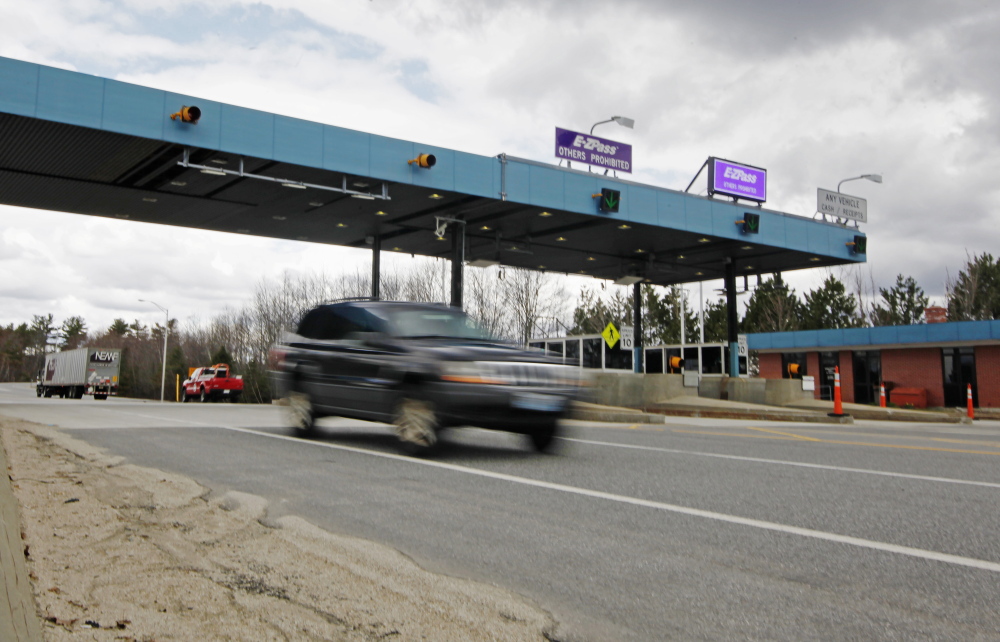AUGUSTA — When drivers from New Hampshire or Massachusetts breeze through a Maine toll plaza without paying, chances are a letter from the Maine Turnpike Authority requesting payment will soon follow.
If they don’t pay up, Massachusetts or New Hampshire could block those drivers from renewing their vehicle registrations – just as Maine can suspend the registrations of toll scofflaws from Maine.
When it comes to Maine’s northern neighbors, however, the turnpike authority is out of luck. And some Canadian drivers know it.
One tractor-trailer from New Brunswick, for instance, had racked up 88 toll violations totaling $677 as of October 2013. According to turnpike authority figures, the top 20 toll violators from New Brunswick – all of them tractor-trailer trucks – compiled 548 violations worth more than $4,300.
The turnpike authority is hoping to end the free-for-all – or at least send a message to the biggest offenders.
A bill endorsed by a legislative committee in late April would allow the Secretary of State’s Office to suspend the rights of out-of-state violators to operate a vehicle on Maine roads. But first the authority would have to send a notice to the offending vehicle’s owner.
“This is not going to solve our out-of-state problem, but it is going to give us the ability to apply it to the high rollers and to some of the biggest of the offenders,” said Peter Mills, executive director of the turnpike authority. The turnpike is a toll highway that runs for 109 miles on Interstate 95 between Kittery and Augusta.
Mills said Massachusetts and New Hampshire drivers top the list of out-of-state toll offenders, but because of the authority’s cooperation with its counterparts in those states, Maine is able to recoup some of the losses. New Brunswick drivers rank high on the list as well, although Mills said the losses are more of an irritation than a major financial concern for an agency that collected $123.6 million in tolls last year.
Violations arise from both passenger cars and trucks from Canada, but Mills said it’s the truckers who are the biggest and most consistent offenders. Only one New Brunswick passenger car had more than five violations in the October 2013 data set that Mills presented to the Legislature’s Transportation Committee. Meanwhile, more than 30 trucks had 10 or more violations.
Mills said some truckers would even laugh and wave at the toll-takers as they blew through the toll lane at high speed in an attempt to evade the cameras trained on license plates.
For the past three years, Maine, New Hampshire and Massachusetts have worked under a reciprocal agreement that allows each to chase offenders living in the other states.
The processing centers at each state share toll violations with one another. If someone from Massachusetts drives through the York toll plaza without paying, a picture of the violator’s license plate taken by automated cameras will lead the Maine Turnpike Authority to the vehicle’s registered owner.
If the owner does not respond to a notice of violation letter from the Maine Turnpike Authority – either by paying the toll or contesting it – the authority can eventually request that the secretary of state suspend the owner’s right to drive on Maine roads.
Maine does not have a reciprocal relationship with New Brunswick, however, and tracking down those offenders across the international border has been a challenge. L.D. 987, sponsored by Democratic Rep. Andrew McLean of Gorham, would give the authority the additional power to pursue tolls or suspend the Maine driving rights of violators from Canada and other jurisdictions.
The authority could attempt to use documents on file in Maine – such as at truck weigh stations – to track down the registered owners of Canadian trucks that have numerous violations. Because of the manpower involved, Mills suggested the authority would likely focus largely on the most egregious offenders.
“This will catch some of the high rollers and nip it in the bud,” Mills said.
The Maine State Police said it probably won’t take many right-to-operate suspensions – which can lead to tickets and impoundments of vehicles if they’re caught operating in Maine – to send a message.
“I would assume that this would only occur a few times before the word would spread that you better stop and pay your tolls in Maine!” Lt. Brian Scott, commanding officer of the state police Traffic Safety Unit, wrote in testimony to the Transportation Committee.
An amended version of the bill earned a unanimous endorsement from the Transportation Committee and now heads to the full Legislature for consideration.
Send questions/comments to the editors.



